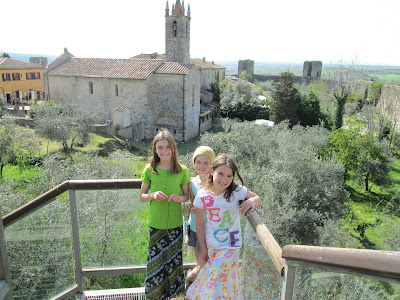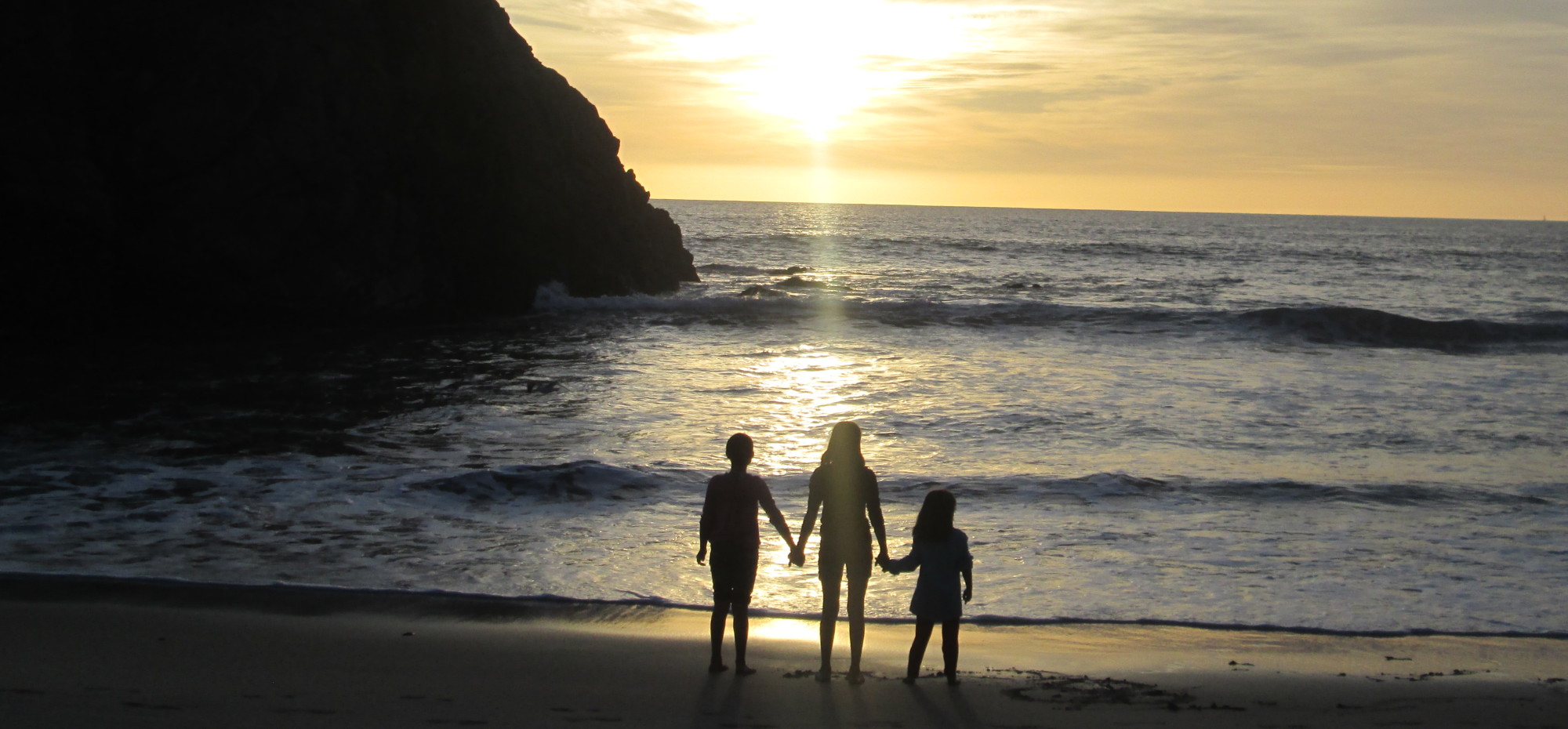 |
| Piazza de Campo in Siena |
 |
That tower is the one we climbed.
Most of us climbed, I should say. |
Fortified by a low-key day yesterday, today we hustled most of the troops into the car for a trip to nearby Siena. (When I say “hustled”, I mean we got on the road by 10:45. When I say “nearby”, I mean over an hour on winding, hilly roads. Our two cars full of greenish travelers could not understand how the locals manage to travel around here on a regular basis. I think I’m becoming more, rather than less, susceptible to carsickness. Or maybe Bob’s just becoming more comfortable and driving faster on these roads.)
 |
| Picnic in the piazza |
Siena is one of the most famous towns in Tuscany. It has a huge piazza that is used for an annual horse race competition between its different neighborhoods, and many ancient and picturesque buildings. We wandered the winding, cobblestone streets and had a picnic in the piazza. (Peanut butter returns again! It’s surprisingly hard to find in Italy, though Nutella is everywhere.)
 |
| Looking up at all that climbing left to be done |
Full of peanut butter energy, Zoe, Nadia, and I climbed the 503 steps to the top of the Torre del Mangia (“Tower of the Eater”), Siena’s tower that dates from the 1300s. The extremely narrow rock passages were interesting and the views from the top were amazing. (Bob has apparently decided he doesn’t have to prove anything to anybody, so he chose to skip this trip.)

Perhaps even more impressive than Siena, in its own way, was our next stop in the medieval village of Monteriggione. The castle walls that surround the city were built starting in 1213 to repel invaders from nearby Florence, and are still remarkably intact. Within the walls is a small village housing shops and restaurants, still inhabiting the original ancient buildings. Our hostess Silvia described this place as “like a fairy tale,” and she was right. (Also, there was gelato. We’ve been eating a lot of gelato and it’s pretty much the focus of the kids’ day. It’s always quite an endeavor because there are so many mysterious flavors and you get to choose two. Sometimes the English translations are even more confusing than the Italian (“milk flower”?) Yesterday, out of sheer curiosity, I got one called
zuppa inglese (“English soup”), which turned out to taste like eggnog.)
 |
| View from the tower |
We seem to have drifted effortlessly into the Italian timetable. No matter what we do, we never seem to manage dinner before 8:00 or so. (Granted, cooking a dinner for 12 takes some doing.) But we don’t have anywhere to be in the morning, so we let schedules go on vacation as well.
***
From Bob:
On the day we visit Siena, the namesake of our beloved Getaway Van, let’s talk about driving in Italy. I’ve figured a few things out about it. One thing I’m convinced of: They do their best to make driving as inconvenient as possible here. There many ways they do this, and probably many reasons for wanting to make it inconvenient, and for the most part they are very successful.

Today’s driving fell mostly into the “country” category. This is the kind of driving that is rather preferable to me, the driver, but it often makes the passengers sick. I don’t think it’s anything that I do wrong that makes them sick. The roads do all that.
In Italy, at least this part of Italy, the beautiful rolling countryside is fine to look at, but it has a predictable effect on the roads. They have to be steep and windy to get through and around all those hills. Today there was a sign that mentioned a 15% grade. This is double what we encountered on our road trip across the US. Let’s not forget that we drove through the Rockies.
 |
In Monteriggione. You could climb up to the top of the city walls and
look out over the village on one side and the Tuscan countryside on the other. |
The roads of Rocky Mountain National Park are a good foil for the roads of rural Tuscany. Avid readers of this blog will remember that we took a quite horrifying drive across RMNP on the highest continually paved road in the US. This, it turns out, was good training for driving here. Turns and grades are common, guard rails and wide shoulders are not. The Tuscan roads are very reminiscent of all the National Park roads we traveled last year in that they are all very narrow – two small lanes and absolutely nothing on the side to give any wiggle room. In both places the philosophy must be: We will mar the landscape with as little pavement as necessary.

So driving here is like driving in a National Park. On the positive side, our nice, little Audi A4 station wagon is nimble, has plenty of power and is not overloaded with all our possessions. It’s also brand new; it had 18 km on it when we picked it up in Rome. Therefore, unlike in RMNP, I do not feel that the brakes are going to give out at any second.
On the other hand (and this may be because I have such confidence in my brakes) every single other driver (except, perhaps, Chris Brooks in the landlords’ Fiat) on the road wants to pass me. This was fine on the autostrada – the A1 highway – where there are two comfortable lanes going each way. Here, it means I have to pull over four or five times a trip to let people by.
We’re used to this by now, and there’s some evidence that the passengers among us are starting to get their sea legs. I don’t think anyone got terribly ill on the trip back for Montereggione today. Just about all of the chili we made for dinner got eaten, suggesting a minimum of nausea.
We’re also getting used to countryside navigation, our experiences with which have taught us not to think too far ahead. We basically travel from town to town and don’t take much regard for the name of the road we’re on. We’ve also realized by now that there is no flat, straight route home. Any way from here to there or from there to here is curvy and hilly. That’s the way it is. Get over it.
So that leaves city and town driving, which is more unpleasant in a highly stressful, fraught with uncountable dangers sort of way. In urban settings, particularly the big ones like Rome and Siena, most people drive these tiny little cars. I would say that a SmartCar is about average. There are multipe makes and models that are smaller than a SmartCar. Our A4 is the size of a small station wagon, and I would say it’s in the top 25th percentile in terms of size or cars in the city, especially if you discount commercial vehicles. This means when it comes time to park, there’s little room for error. Everything is done to scale. The cars are smaller, the roads are narrower, the parking spaces are claustrophobic.
 |
A much better way to travel than car.
Although a car is likely to roar around the
corner and crush them at any moment. |
We were in a parking garage today and Chris realized how glad he was not to have the minivan he had planned to rent. It would have been impossible to get around the tight corners, up the ramps and into position to park, and you would not have been able to open the van doors even if you managed to fit it into the spot.
Sorry, Getaway Van, you’ll never see Siena.
The up side to city driving here is that they’re enamored with traffic circles, and they follow the Portsmouth model as opposed to the Auburn, ME, model. If you live in Auburn, ME, and want to explore Rome, take the bus. You can’t do your either lane can exit the circle shenanigans here. In fact, Mr. Auburn, take the bus when you’re in Portsmouth, too. You’re aggravating.
The last part about driving here is really more about walking. Just about any paved or cobblestone pathway seems to be fair game for cars and for pedestrians. It was a great walk from our parking garage to the main square in Siena, five people could walk abreast along the cobblestone way with shops on either side…until a car comes crawling up and everyone has to retreat to the edges to let it pass. Nobody seems to mind this, but it must be intensely frustrating for the drivers to get through this mess of people.
Even in Montereggione, an ancient setting if I’ve ever been to one, cars were driving around in the medieval square. Don’t get your hopes up, Getaway Van. We’re not taking you there either.
